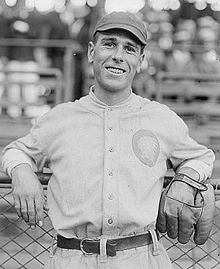Fred Snodgrass
| Fred Snodgrass | |||
|---|---|---|---|

Snodgrass in 1916
|
|||
| Outfielder | |||
|
Born: October 19, 1887 Ventura, California |
|||
|
Died: April 5, 1974 (aged 86) Ventura, California |
|||
|
|||
| MLB debut | |||
| June 4, 1908, for the New York Giants | |||
| Last MLB appearance | |||
| October 5, 1916, for the Boston Braves | |||
| MLB statistics | |||
| Batting average | .275 | ||
| Stolen bases | 215 | ||
| Runs | 453 | ||
| Teams | |||
| Career highlights and awards | |||
|
|||
Frederick Carlisle "Snow" Snodgrass (October 19, 1887 – April 5, 1974) was an American center fielder in Major League baseball from 1908 to 1916 for the New York Giants and the Boston Braves. He played under manager John McGraw and with some of the game's early greats, including Christy Mathewson. He is best known for dropping a key fly ball in the 1912 World Series. Snodgrass was immortalized in the Lawrence Ritter book The Glory of Their Times.
Snodgrass hit a career high .321 in 1910, his first full season with the Giants. From 1911 to 1913, he played in three consecutive World Series, but the Giants lost all three. In the second, the 1912 Series, Snodgrass committed one of the most famous errors in baseball history. In the 10th inning of the deciding game, Snodgrass, who was among the National League's best outfielders, dropped a routine fly ball that put the tying run on second base. He proceeded to make a spectacular game-saving catch on the next play, but the Sox went on to score two runs in the inning to win the series.
Giants manager John McGraw was not among those who blamed Snodgrass for the loss. In his book My Thirty Years in the Game, McGraw remarked, "Often I have been asked what I did to Fred Snodgrass after he dropped that fly ball in the World Series of 1912...I will tell you exactly what I did: I raised his salary $1,000." Just the same, the error became known as "Snodgrass's Muff" and also, the "$30,000 Muff."
Part way through the 1915 season, with his batting average below .200, New York released Snodgrass. He subsequently signed with the Boston Braves. The next year, 1916, was his last. Despite hitting .249 for the Braves that season, he retired from the game.
In the early 1960s, a half-century after his infamous dropped ball, Snodgrass recounted the error in an interview with author Lawrence Ritter. The interview was included in Ritter's renowned baseball book The Glory of Their Times, which featured oral accounts by 26 of the game's oldest surviving players.
...
Wikipedia
